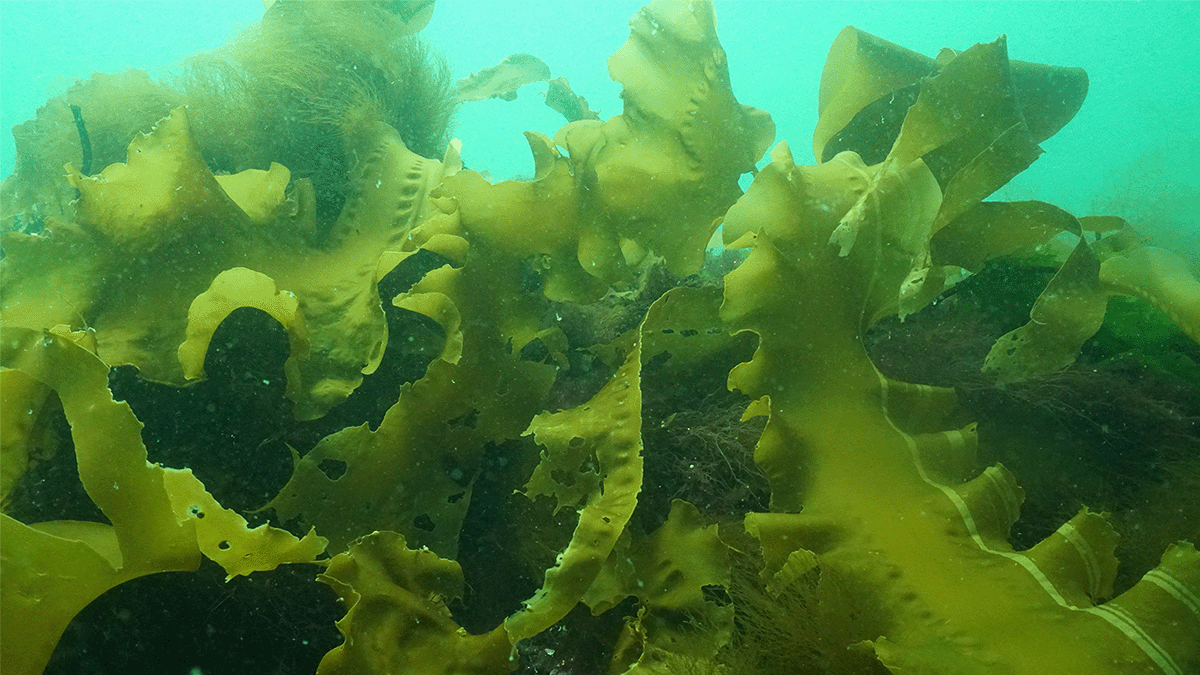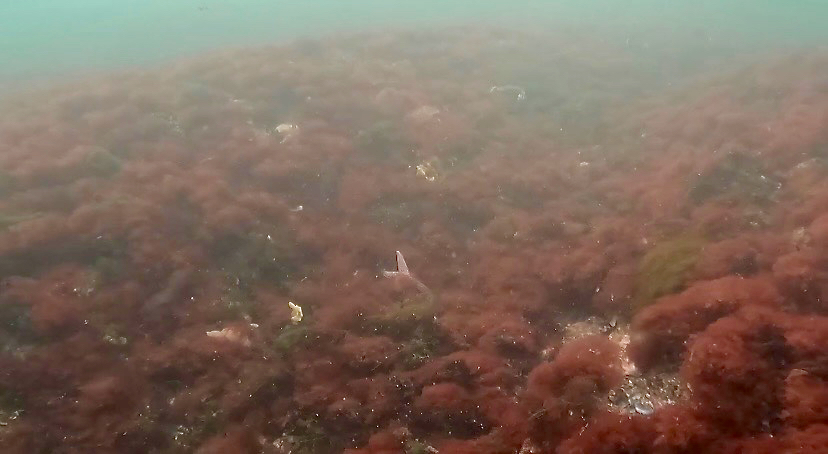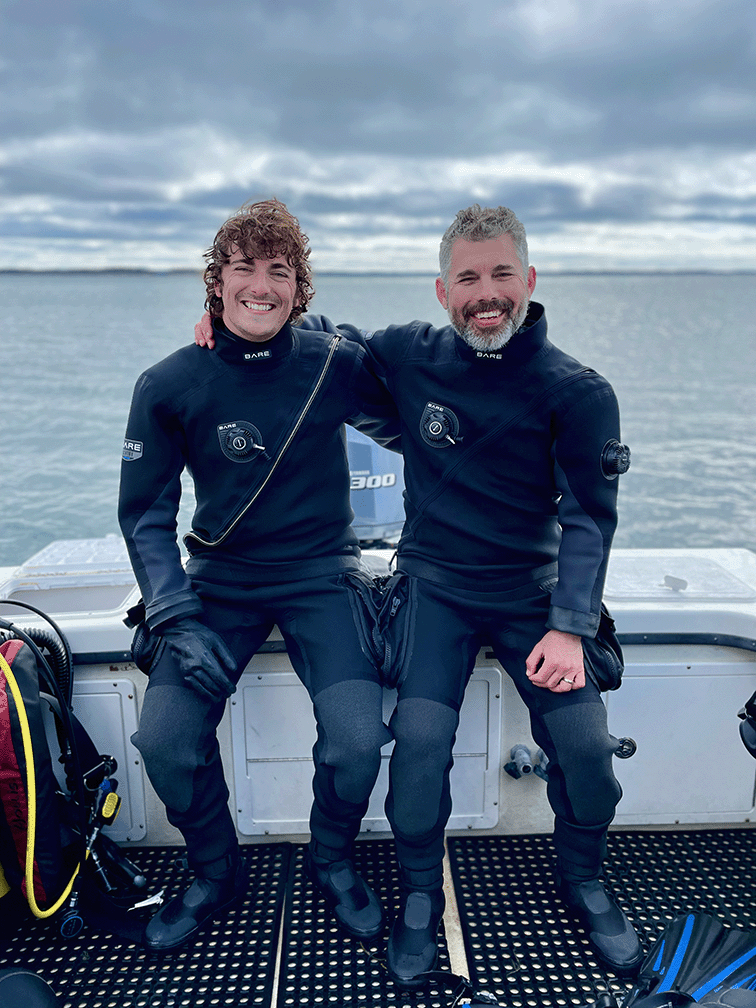
From forests to fields: the transition from kelp to turf amidst climate change in the Gulf of Maine
By Camryn Sudimick
While not as expansive as the renowned kelp forests of California and other parts of the world, the Gulf of Maine (GoM) is also home to a diverse kelp forest ecosystem on its rocky reefs. These out-of-sight underwater forests are known to foster biodiversity, providing vital resources and habitats for various marine organisms. Unfortunately, the GoM has been warming at a rapid rate. Because kelp thrives in cool, nutrient-rich water, the warming waters have led the once-thriving, three-meter-tall kelp forests to be replaced by red filamentous turf algae, which only stands a few centimeters tall. This ecosystem shift is analogous to a forest being flattened to grassland.
Researchers at Bigelow Laboratory for Ocean Sciences are working to explore the effects of this transformation in the GoM as part of the NSF EPSCoR RII Track 1 Maine eDNA project. These researchers include Shane Farrell, a Ph.D. student studying Marine Biology at the University of Maine, Orono who is co-advised by Damian Brady (Agatha B. Darling Professor of Oceanography, UMaine) and Doug Rasher (Senior Research Scientist, Bigelow Laboratory). For the past three years, Farrell has been focusing on how this habitat transition from kelp-dominated to turf-dominated reefs impacts the ecosystem. His research is a part of the Maine-eDNA “Species on the Move” theme, which, in part, examines the effects of range shifts in foundational taxa, such as kelp, on ecologically linked processes along the coast.
To document changes in these ecosystems, Farrell integrated both visual SCUBA surveys and environmental DNA. “By merging visual surveys and environmental DNA (eDNA) sampling, it allows us to infer the most out of the system,” Farrell explained. For the past three summers, Farrell and the Rasher lab conducted visual SCUBA surveys, observing changes in the algal, fish, and invertebrate communities, along Maine’s coast. During those dives, they also collected eDNA which allows Farrell to identify the presence of species that are overlooked during traditional visual surveys, including cryptic and invasive species. Additionally, he has been gathering samples of benthic microbial biofilms and water samples for chemical analysis to try and understand how microbial communities and chemical landscapes change on turf-dominated reefs. Ultimately, he is trying to identify possible chemical cues that could have detrimental impacts on the recruitment and settlement of kelp in these turf-dominated ecosystems.

Courtesy of Shane Farrell
While Farrell’s research is ongoing, it has already revealed some key takeaways. Firstly, he has observed that this shift from kelp-dominated to turf-dominated reefs is happening much more rapidly than anticipated. He has also noticed that these shifts are occurring further East than ever before. “We are seeing this shift happening as far East as Penobscot Bay now. Just five years ago, it was confined to Casco Bay,” he highlighted. A second key finding is that this transition has led to significant differences in the microbial and chemical communities. Farrell observed that as kelp declines, there is a proliferation of red turf algae. According to Farrell, “In other systems, like coral reefs, it has been shown that when macroalgae and red turf algae proliferate, it is detrimental for the ecosystem.” This is because red turf algae are known to produce organic chemical compounds known as exudates. As the abundance of red turf algae increases, so does the release of these chemical exudates. “These exudates have the potential to limit the settlement and survival of kelp on the reef, ultimately limiting their recovery and resilience,” he elaborated. This creates feedback loops that perpetuate the shift towards turf dominance. Farrell’s research highlights a potential new mechanism known as “chemical warfare” creating these feedbacks. Farrell is interested in exploring this mechanism further and understanding what this means for the ecosystem.
This research has implications for marine ecosystems worldwide. As Farrell noted, “These habitat shifts on reefs are not just happening here in Maine, but around the globe.” The observed transition to turf dominance is a common thread among various ecosystems, as exemplified by occurrences in Norway, the Northwest Atlantic, and parts of Australia. “We need to understand here in Maine, and globally, what the implications of this shift are,” he emphasized. This is a central focus of the Rasher Lab, with research spanning the kelp forest fish communities and population genetics of kelp, to investigating the role of chemicals and microbes.
Farrell’s research has opened up numerous avenues for future research. There are still many questions that he has yet to answer, such as the driving forces behind the spread of red turf algae. While increased nutrients, warming waters, and faster growth rates are potential factors, he points out that there is a lack of studies investigating the effects of environmental conditions on turf spread. Moreover, there is a pressing need to identify chemicals and their sources on these reefs. “We are finding almost 20,000 unique chemicals from various sources, but we only know the identity of 2.5% of the chemicals there,” said Farrell. Exploring and identifying new chemicals is crucial in understanding species interactions and ecological dynamics. There are also some human applications for identifying new chemicals. For instance, Farrell mentioned that when it comes to the pharmaceutical field, many antibiotics and anti-cancer drugs on the market today come from marine ecosystems like coral reefs, while temperate systems are still underexplored.
This habitat shift is not only altering the landscape of the GoM but also the landscape of rocky reefs all over the globe. As we strive to understand and mitigate the effects of climate change on marine ecosystems, Farrell’s work underscores the urgency of addressing these habitat shifts and identifying their implications for the health and resilience of rocky reefs worldwide.

